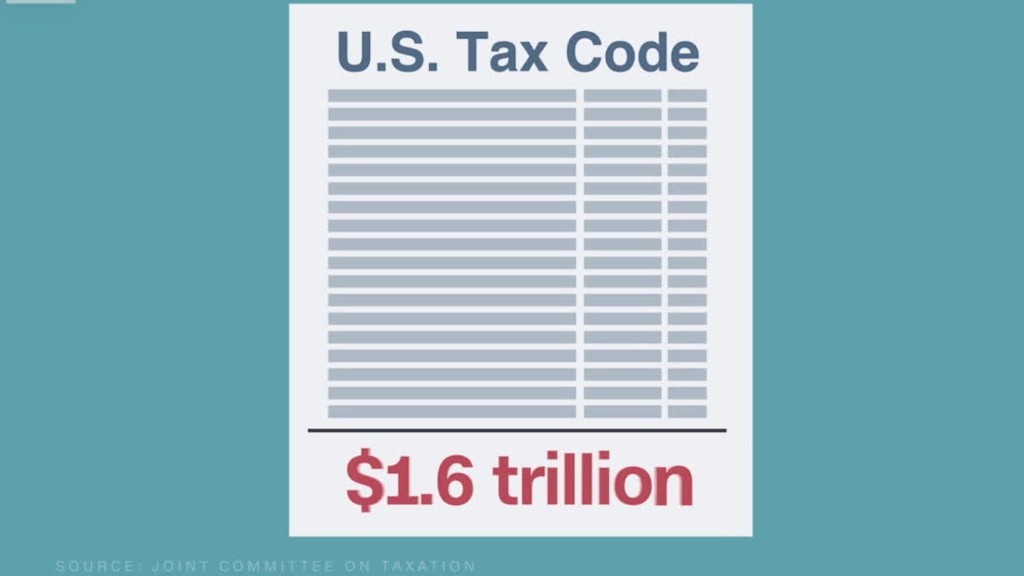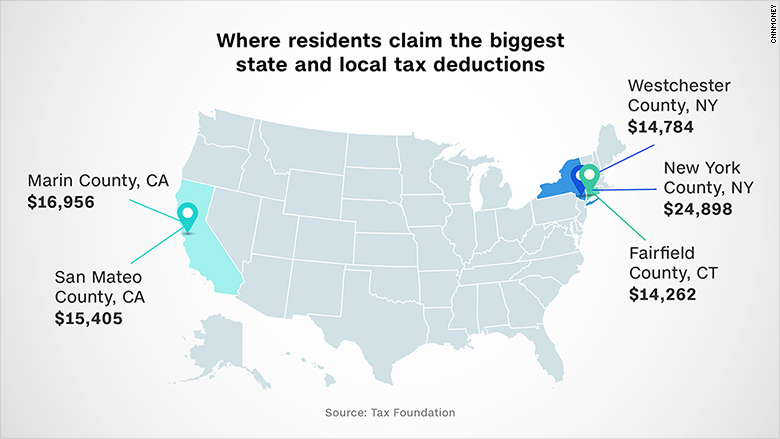
Live in New York or California? You could end up losing a major tax break if tax reform is passed.
That's because under proposals from House Republicans and the White House the state and local tax deduction would be repealed, along with all other itemized deductions except those for mortgage interest and charitable contributions.
It's too early, however, to predict its demise, both because tax reform is far from a done deal and the state and local tax break has bipartisan support in many quarters.
What is it and who gets it
As federal tax breaks go, the state and local tax deduction is older than the hills.
It's been on the books since 1913, the same year the modern federal income tax was created.
Under current law, tax filers who itemize their deductions may write off their state and local income taxes or general sales taxes, plus their property taxes.
Those most likely to claim the state and local tax deduction are residents of high-tax states, especially those making more than $100,000.
One of the most expensive tax breaks in the code, the state and local deduction will reduce federal revenue by an estimated $96 billion in 2017 alone and $1.3 trillion over the next decade, according to the Tax Policy Center.
But that cost is not evenly distributed. An analysis of IRS data by the Tax Foundation found that just six states -- California, New York, New Jersey, Illinois, Texas and Pennsylvania -- account for more than half of the foregone revenue.
Related: Most conservative House members list tax reform demands
Drilling down further, just four states -- New York, California, Connecticut and New Jersey -- are home to the 10 counties where residents claim the highest state and local tax deductions in the country.

New York County, aka Manhattan, is No. 1 -- with residents claiming an average of nearly $25,000 a year on their federal returns. That can save someone about $7,000 in federal income taxes if their top federal rate is 28%. If they're in the 33% bracket, they'd save even more at $8,250.
Marin County, California, comes in second, with residents there claiming an average of nearly $17,000. For someone in the 33% bracket, that's a tax savings of $5,610.
Of course, average deductions don't reflect the very large amounts claimed by those at the top of the income scale. For instance, someone in the 39.6% bracket could easily claim more than $100,000 in state and local deductions, saving a minimum of $40,000 in federal income taxes.
If the deduction is repealed, those savings would be gone.
Not without a fight
Tax experts note that the deduction indirectly subsidizes states and local governments because it lessens the bite of the tax burden they impose on residents.
"A $100 increase in state income taxes costs a taxpayer in the 35% federal income tax bracket just $65 [$100-$35]," Tax Policy Center senior fellow Frank Sammartino noted in an analysis.
"It also encourages [states] to use deductible taxes in place of nondeductible taxes (such as sales taxes on alcohol, tobacco and gasoline)," Sammartino said.
Critics contend that the deduction disproportionately benefits the well off and argue that state and local taxes are really just payments for local services and projects.
But supporters note that payment for such services (e.g., transportation, public safety and education) benefit far more people than just local residents.
Plus, the states that benefit most from the deduction also pay more than their fair share of federal revenue, according to a bipartisan group of 68 congressmen.
"Our states are economic engines that deliver disproportionately more revenue to the federal government than they receive back, paying more for services delivered to the country at large," the lawmakers wrote in a letter Monday to Treasury Secretary Steven Mnuchin.
A coalition of groups representing state governors and local mayors will also fight the proposed repeal.
"Eliminating or capping [the deductibility of state and local taxes] would represent double taxation, as these taxes are mandatory payments for all taxpayers," the coalition wrote in a letter to lawmakers.
What's more, the groups argued, repeal of the tax break could shrink residents' disposable income, which in turn could harm the economy.


